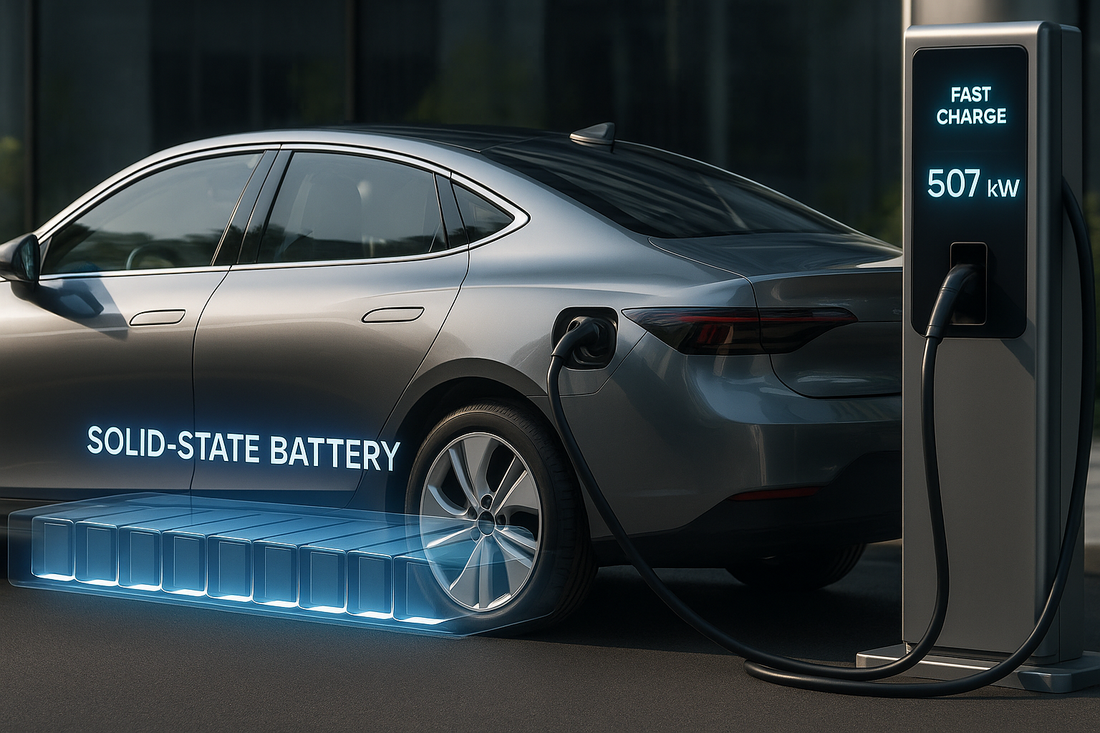
Solid-State Batteries: EV Breakthrough, Faster Charge for EVs?
Share
Solid-State Batteries: EV Breakthrough, Faster Charge for EVs?
In the quest for more efficient and reliable energy storage, solid-state batteries have emerged as a potential breakthrough in the realm of electric vehicles (EVs). With the promise of faster charging times, increased safety, and enhanced energy density, solid-state battery technology could revolutionize the EV industry. As manufacturers and researchers delve deeper into this innovative technology, the future of EVs looks promising, potentially offering longer miles of range and a more sustainable solution for electric transportation.
Understanding Solid-State Batteries
What Are Solid-State Batteries?
Solid-state batteries represent an advanced form of battery technology that replaces the liquid or gel electrolyte found in traditional lithium-ion batteries with a solid electrolyte. This change in battery material leads to a significant improvement in energy density and safety. By utilizing solid electrolytes, these batteries can accommodate lithium metal as an anode, which contributes to higher energy density and potentially doubles the range of electric cars. Consequently, solid-state batteries could provide a longer lifespan and more charge cycles than today’s lithium-ion batteries.
Comparison with Traditional Lithium-Ion Batteries
When compared with conventional lithium-ion batteries, solid-state batteries offer numerous advantages. The absence of liquid electrolytes in solid-state cells reduces the fire risk associated with charge and discharge processes. Moreover, solid-state technology allows for nearly double the range per single charge due to the higher energy density. While today’s batteries are limited by their battery material and performance, solid-state batteries promise enhanced safety and efficiency, making them a potential game-changer in the EV industry.
Key Components of Solid-State EV Batteries
The key components of solid-state EV batteries include the solid electrolyte, lithium metal anode, and energy-dense cathode materials. The solid electrolyte is crucial for conducting lithium ions between the electrodes while providing structural integrity and reducing safety risks. The lithium metal anode offers a high energy density, which is instrumental in improving battery performance and extending miles of range. Together, these components form a robust battery pack that supports the demands of modern electric vehicles, paving the way for the future of renewable energy in transportation.
Breakthroughs in Battery Technologies
Recent Advances in Solid-State Battery Development
In recent years, significant strides have been made in the development of solid-state batteries, positioning them as a revolutionary force in battery technologies. Researchers are focusing on refining the solid electrolyte to improve conductivity and stability, crucial for efficient lithium ion movement. Companies like Toyota are at the forefront of this innovation, aiming to commercialize solid-state EV batteries that promise to outperform conventional lithium-ion batteries. These advancements could lead to safer, more reliable electric vehicles, ultimately transforming the landscape of energy storage.
High Energy Density and Its Benefits
Solid-state batteries are renowned for their high energy density, a feature that sets them apart from traditional lithium-ion batteries. This increased energy density allows for a greater storage capacity within the same volume, offering the potential to nearly double the range of electric cars. The implications for EVs are profound: longer driving distances on a single charge, reduced frequency of charging, and an overall enhancement in battery performance. This breakthrough in energy density not only benefits EVs but also promotes the broader adoption of renewable energy solutions.
Leap in Energy Storage Solutions
The leap in energy storage solutions brought about by solid-state battery technology is reshaping the future of electric vehicles and beyond. By eliminating the fire risk associated with liquid electrolytes, solid-state batteries pave the way for safer, more efficient battery systems. These batteries offer a longer lifespan and more charge cycles, addressing the limitations of today’s lithium-ion batteries. As this new battery technology continues to evolve, the potential applications extend beyond transportation, impacting various sectors that rely on efficient energy storage and sustainable practices.
Performance and Range of Solid-State EVs
Battery Performance Compared to Conventional EV Batteries
Solid-state batteries represent a monumental shift in battery performance when compared to conventional lithium-ion batteries. The adoption of a solid electrolyte in place of a liquid electrolyte eradicates common safety concerns while significantly boosting energy density. Battery materials in solid-state batteries facilitate more efficient charge and discharge cycles, which translates to a higher performance threshold. These advancements ensure that solid-state EV batteries not only meet but exceed the expectations set by today's batteries, heralding a new era of energy storage and electric vehicle efficiency.
Nearly Double the Range: Myth or Reality?
The claim that solid-state batteries could nearly double the range of electric vehicles is rooted in their high energy density. By integrating lithium metal anodes, these batteries can store more energy in the same space as traditional lithium-ion batteries. This configuration allows for a significant increase in miles of range per single charge. While some skepticism remains, ongoing solid-state battery development points towards this potential becoming a reality, offering electric car users extended driving distances without sacrificing battery performance or safety.
Potential for Longer Lifespan and Reduced Fire Risk
Solid-state batteries promise not only a longer lifespan but also a substantial reduction in fire risk. The solid electrolyte used in these batteries inherently mitigates the dangers associated with liquid electrolytes, which are prone to leaks and combustion. This structural innovation enhances battery pack safety and longevity, ensuring that solid-state EVs can endure more charge cycles with consistent performance. By addressing these critical aspects, solid-state technology positions itself as a superior alternative to conventional lithium-ion batteries, fostering a safer and more reliable electric vehicle industry.
Future of Solid-State EV Batteries
Challenges in Solid-State Battery Adoption
Despite the promising potential of solid-state battery technology, several challenges remain in its widespread adoption. Manufacturing complexities, high production costs, and the need for specialized materials pose significant hurdles. Furthermore, scalability and integration into existing electric vehicle infrastructure require substantial research and development efforts. Overcoming these barriers is crucial for solid-state batteries to transition from breakthrough innovation to mainstream application, ensuring that they can effectively replace traditional lithium-ion batteries in the market.
The Role of Lithium in Future Battery Technologies
Lithium continues to play a pivotal role in the evolution of future battery technologies, including the development of solid-state batteries. The utilization of lithium metal anodes increases energy density and enhances battery performance, making it a focal point for researchers and manufacturers. As demand for efficient energy storage solutions grows, the strategic sourcing and sustainable management of lithium resources will be vital. This will ensure the viability of solid-state batteries and their ability to meet the energy demands of next-generation electric vehicles.
What’s Next for EVs and Solid-State Battery Innovations?
The future of EVs and solid-state battery innovations is full of promise and potential. As solid-state battery technology advances, we can expect continual improvements in energy density, safety, and cost-effectiveness. Companies like Toyota are investing heavily in research and development to bring the first solid-state EVs to market. These efforts, combined with global shifts towards renewable energy, indicate a transformative period for electric vehicles. The successful integration of solid-state batteries into EVs could redefine transportation, offering sustainable and efficient solutions for a cleaner future.
